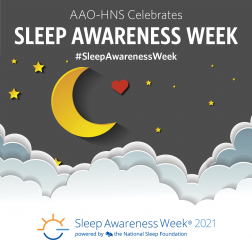 We’ve all the heard the phrase, “I can sleep when I’m dead!” Well, the fact of the matter is, if you aren’t getting adequate sleep, you might be doing just that! Sleep deficiency can lead to physical and mental health problems, injuries, loss of productivity, and even a greater risk of death. But, the good news is that better sleep can increase your overall health and well-being. In honor of Sleep Awareness Week, we want to make sure you know why sleep is important to your overall health and how you can improve your sleep quality.
We’ve all the heard the phrase, “I can sleep when I’m dead!” Well, the fact of the matter is, if you aren’t getting adequate sleep, you might be doing just that! Sleep deficiency can lead to physical and mental health problems, injuries, loss of productivity, and even a greater risk of death. But, the good news is that better sleep can increase your overall health and well-being. In honor of Sleep Awareness Week, we want to make sure you know why sleep is important to your overall health and how you can improve your sleep quality.
How sleep works
Like breathing, eating and drinking, sleep is a basic human need and a vital part of good health. Your body controls when you’re awake and asleep by following your internal “body clock” – a 24-hour repeating rhythm called the circadian rhythm. This affects every part of your body and how it works.
There are two basic types of sleep: rapid eye movement (REM) and non-REM. Dreaming usually occurs during REM Sleep, while non-REM sleep is also referred to as a deep sleep. In general, your body will go through a regular pattern of non-REM and REM sleep about 3 to 5 cycles each night. If you’re not getting enough sleep or this pattern is getting interrupted, you’ll feel tired during the day.
How much sleep is enough?
Sleep deficiency is a common public health problem in the United States. People in all age groups report not getting enough sleep.
While it’s a common belief that people can learn to get by on little sleep with no negative effects and their body will “adjust,” research shows that getting enough quality sleep at the right times is vital for mental health, physical health, quality of life, and safety.
The amount of sleep you actually need varies from person to person and changes over the course of your life. The chart below shows general recommendations by age group.
|
Age |
Recommended Amount of Sleep |
|
Infants aged 4-12 months |
12-16 hours a day (including naps) |
|
Children aged 1-2 years |
11-14 hours a day (including naps) |
|
Children aged 3-5 years |
10-13 hours a day (including naps) |
|
Children aged 6-12 years |
9-12 hours a day |
|
Teens aged 13-18 years |
8-10 hours a day |
|
Adults aged 18 years or older |
7–8 hours a day |
Source: https://www.nhlbi.nih.gov/health-topics/sleep-deprivation-and-deficiency
The effects of not getting enough sleep
We’ve all experienced a lack of sleep at one point in time or another. Whether staying up late at a party, taking care of a baby, ending a busy week at work, or recovering from a time change after a vacation, your body eventually makes up for lost time.
But if you have a sleep disorder or simply choose to not listen to your body, the effects of not getting enough sleep include:
- Weight Gain/Obesity
- Unstable Emotions
- Weakened Immune System
- Problems Learning, Focusing & Reacting
- Trouble Making Decisions or Solving Problems
- Lack of Energy
- Depression
- Chronic Health Problems (Heart Disease, Kidney Disease, High Blood Pressure, Diabetes, Stroke)
As part of a health survey for the Centers for Disease Control and Prevention, about 7–19 percent of adults in the United States reported not getting enough rest or sleep every day.
How to get enough sleep
So what can you do to help yourself get the sleep you need? According to the National Heart, Lung and Blood Institute:
- Go to bed and wake up at the same time every day. For children, have a set bedtime and a bedtime routine.
- Try to keep the same sleep schedule on weeknights and weekends. Limit the difference to no more than about an hour. Staying up late and sleeping in late on weekends can disrupt your body clock's sleep–wake rhythm.
- Use the hour before bed for quiet time. Avoid strenuous exercise and bright artificial light, such as from a TV or computer screen. The light may signal the brain that it's time to be awake.
- Avoid heavy and/or large meals within a couple hours of bedtime. (Having a light snack is okay.) Also, avoid alcoholic drinks before bed.
- Avoid nicotine (for example, cigarettes) and caffeine (including caffeinated soda, coffee, tea, and chocolate). Nicotine and caffeine are stimulants, and both substances can interfere with sleep. The effects of caffeine can last as long as 8 hours. So, a cup of coffee in the late afternoon can make it hard for you to fall asleep at night.
- Spend time outside every day (when possible) and be physically active.
- Keep your bedroom quiet, cool, and dark (a dim night light is fine, if needed).
- Take a hot bath or use relaxation techniques before bed.
Getting the right amount of sleep and starting new habits to consistently get a good night’s sleep is essential to a healthy lifestyle. If you're frequently having trouble sleeping or experiencing some of the symptoms above, schedule an appointment at Orchard Hospital's Medical Specialty Center - Your Everyday Health Care Clinic.
Our mission at Orchard Hospital is to provide our community with superior health care. We strive to ensure that your experience at Orchard Hospital is as pleasant and comfortable as possible. Our priority is to provide you with the care you need when you need it, with skill, compassion, and respect.



